Engineering Leadership in Action: Highlights from LeadDev New York 2024
Reading time: ~ 5 minutes
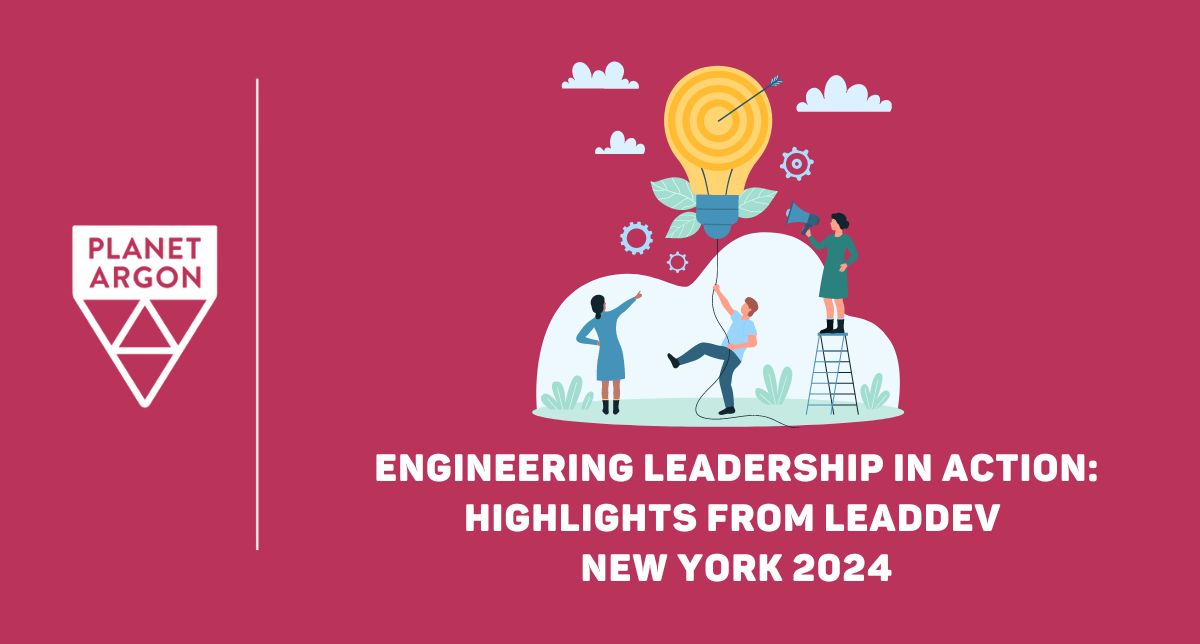
LeadDev New York 2024 took place on September 4th and 5th, and I was fortunate enough to attend the East Coast trip. This was my second LeadDev Conference. The first was in Oakland, CA, in 2022, and I found it one of the most insightful and valuable conferences I’d ever attended, so my hopes and expectations were pretty high! As expected, the folks at LeadDev did not disappoint. The following are some highlights of the talks I found the most actionable, informative, and inspiring. Enjoy!
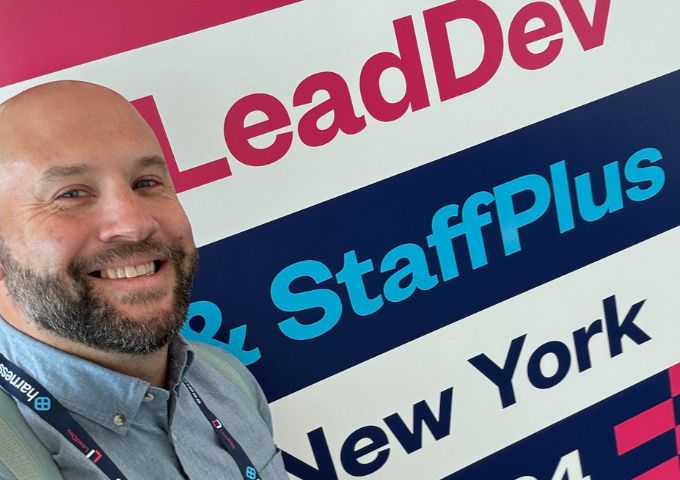
Melissa DePuydt, Sr. Engineering Manager at Medium: The Scrappy/Scale Mindset: A Framework for Sustainable Engineering Leadership
This was probably my favorite conference talk (though there were a few close runners-up). Melissa DePuydt presented a compelling framework that categorizes teams and companies into two modes:
- Scrappy: Characterized by moments of crisis and chaos.
- Scale: Characterized by moments of stability.
One key insight was that most Engineering Managers (EMs) haven't developed the skills to handle both types of moments effectively or to switch between these modes as needed.
Main takeaways:
- Versatility as a Meta-Competency: Versatility only emerges as a skill in the presence of other skills. EMs need to cultivate a versatile mindset to adapt to different contexts.
- Creating Clarity: An EM's role is to create clarity for their team in any context. However, the skills needed to create clarity in moments of stability are not the same as those required in moments of crisis.
- __Practicing Self-Reflection: __Set aside time to identify how you want to appear in scrappy and scale modes.
- Practicing Context Switching:
- Observation: Notice context shifts in any situation, no matter how small.
- Naming: Identify the mode you're in—scrappy or scale.
- Mindful Response: Respond accordingly and mindfully to the identified mode.
The breakdown of the scrappy and scale mindsets was well-expressed and made a lot of sense. It was one of those talks where the concepts felt obvious upon reflection and introduced new ways of thinking. I took three pages of notes!
Sarah Hicks, Founder at The Intentional Organization: Dates and Deadlines—It's Complicated!
Sarah Hicks delivered a thought-provoking talk on the pitfalls of traditional feature roadmaps. Her thesis was that the feature roadmap is a lie and should be replaced by something that doesn't make solid promises or operate on untested assumptions—the hypothesis roadmap.
Main Takeaways:
- Process vs. Outcomes: Feature roadmaps often focus on process (what needs to be done, who needs to do it, timelines) instead of desired outcomes.
- Hypothesis Roadmap:
- Company Objective: Define your goal (e.g., "Increase activation by 10%").
- Hypothesis: Propose a solution based on data and assumptions (e.g., "Our hypothesis is that a new onboarding experience will achieve this goal").
- Confidence Levels: Be transparent about your confidence in both the solution and the timeline (e.g., "Our confidence is 60% in the solution and 20% in the timeline").
- Testing and Updates: Plan to test your hypothesis and update stakeholders regularly.
While this talk was more applicable to product managers or those who interface closely with internal stakeholders, it offered a valuable reframing of how we think about deliverables. Shifting from fixed promises to hypothesis-driven planning can lead to better alignment and outcomes.
Yaphi Berhanu, Senior Front End Engineer at Squarespace: Self-Awareness for Managers
Okay, this might have been my actual favorite talk. Yaphi Berhanu tackled a common and dangerous pattern for managers: continuing to do something because you don't get feedback from your team telling you not to do it. This pattern can block progress and lead to unhappy teams.
Main Takeaways:
Yaphi framed his talk as a journey through a treacherous fantasy land toward self-awareness. This included:
The Fog of Bad Incentives
- The Issue: Direct reports are incentivized to agree with you, which can cloud your judgment.
- The Solution: Reframe disagreement as helpful feedback. Instead of asking, "Do you disagree with me?" try, "What advice do you have for me?"
The Sea of Iceberg Requests:
- The Issue: Asking for "quick" requests often slows or sinks progress on more important work.
- The Solution: Make the priority level clear:
- "This is not urgent."
- "If this will take longer than an hour, let me know."
- "This is urgent; I'll adjust the timelines of your other work."
The Palace of Theory:
- The Issue: Good theories can be terrible in practice, and managers may not follow up to see the real-world effects.
- The Solution:
- Before Implementing a decision, ask yourself, "Who could I be harming with this decision?"
- After implementing a decision, get feedback by asking those affected neutral questions.
Bonus takeaway from Yaphi’s talk: What you thought were windows (transparency) might actually be mirrors (reflecting your own biases). Self-awareness requires active effort and feedback from others.
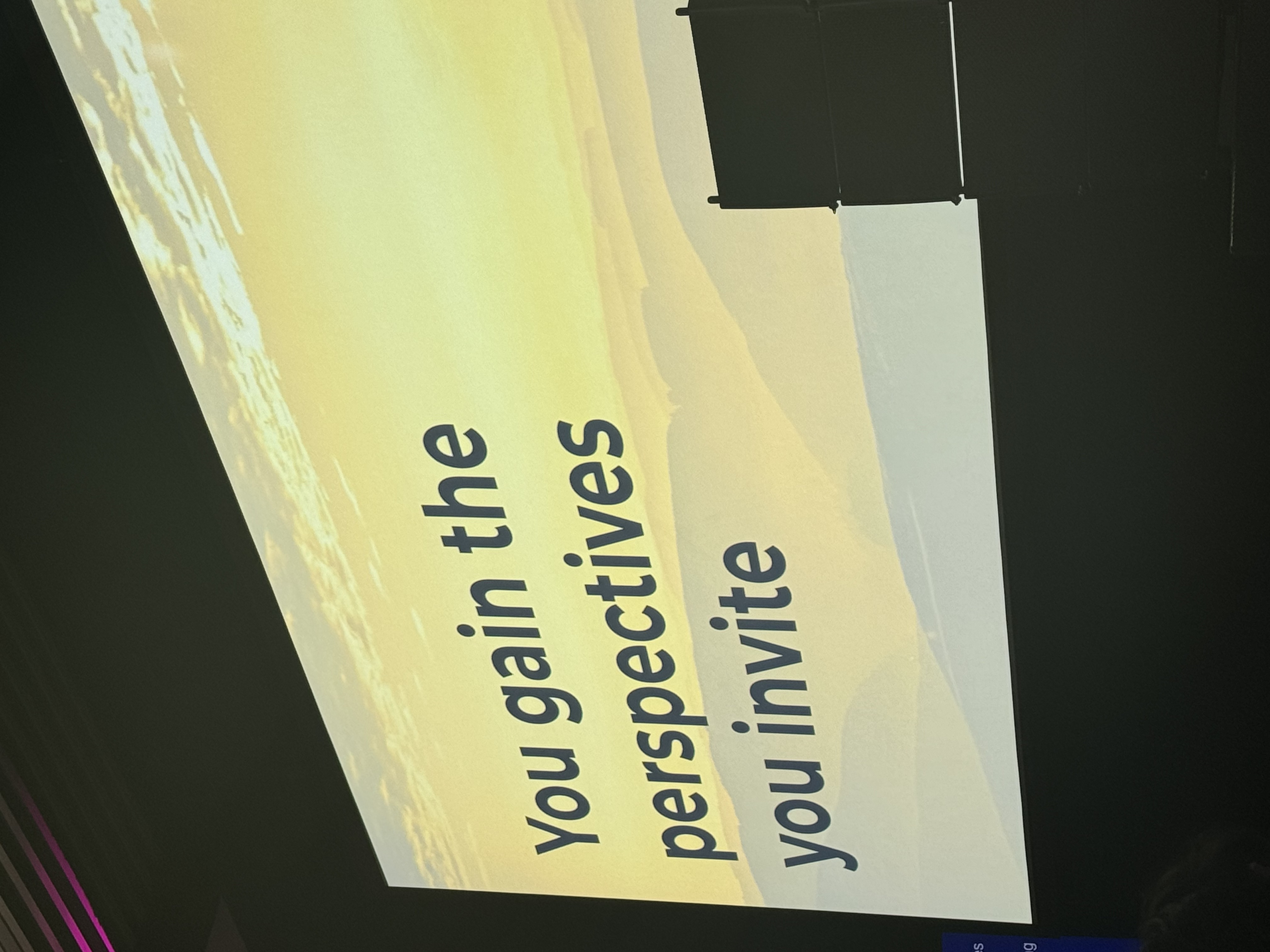
Rachel Jensen, Engineering Manager at Klaviyo: Cultivating Ownership at Any Level
Rachel Jensen addressed the issue of high-performing individuals carrying the weight of ownership for their teams, leading to burnout and knowledge silos. She offered strategies for cultivating broad ownership:
Main Takeaways:
Ask Guiding Questions:
- "What three possible solutions can you think of?"
- "What are the pros and cons of these possibilities?"
Embrace Curiosity:
- Ask team members:
- "What three words would you want people to use to describe you?"
- "What do you want to be working on in three years?"
- "What role do you want to play in this project?"
Respond, Don't React:
- If someone says, "I'd like this in two weeks instead of two months," instead of reacting with, "We don't have two weeks!" respond by asking, "Why do you prefer the two-week solution?"
Practice Gratitude:
- Use intentional recognition and actually say, "Thank you."
Other notable takeaways:
- Employees should set the cadence and length of one-on-ones.
- Negativity is often a result of low confidence or feeling overwhelmed, not a character flaw.
- Setting up guardrails and stepping aside helps developers take ownership—make decisions, take risks, and take responsibility.
Additional Noteworthy Talks
While the above were my favorites, I have to shout out a few other talks that I also found compelling:
Christina Entcheva, Director of Software Engineering at GitHub: Ethics in the Age of AI: Strategies for Mitigation and Their Historical Context
Takeaway: Datasets are inherently fallible, and Large Language Models (LLMs) are especially so. When working with machine learning tools:
- Use smaller, specific models: Focus on targeted applications to reduce unintended consequences.
- Stress test the system: Use adversarial requests to identify weaknesses.
- Demand transparency: Ask models to provide their sources in responses.
Paul Sobocinski, Engineering Director at Thoughtworks: Increasing Code Habitability by Using AI Coding Assistants
__Takeaway: __The snowballing of technical debt and impenetrable code bases are among the biggest causes of developer dissatisfaction. Luckily for us, this can be proactively addressed by using AI coding assistants to improve code habitability in real time.
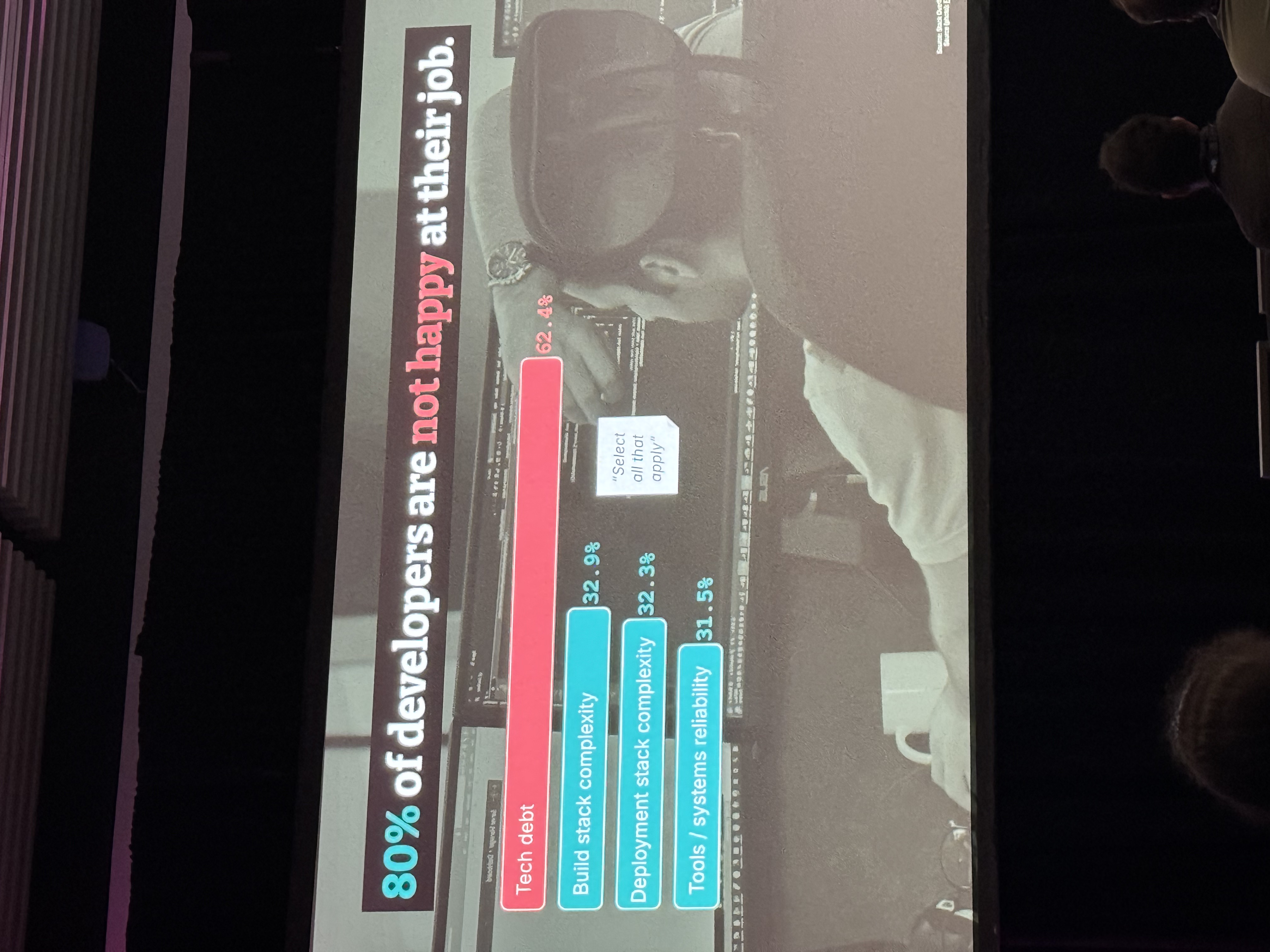
- 80% of developers are unhappy at their jobs; 62% cite technical debt as a primary reason.
- Code habitability, or improving the ability of others to understand and modify code comfortably and confidently, is directly tied to this devex metric.
- Using AI coding assistants to reduce technical debt and improve code habitability is a repeatable, documented solution that can improve this specific area of developer experience.
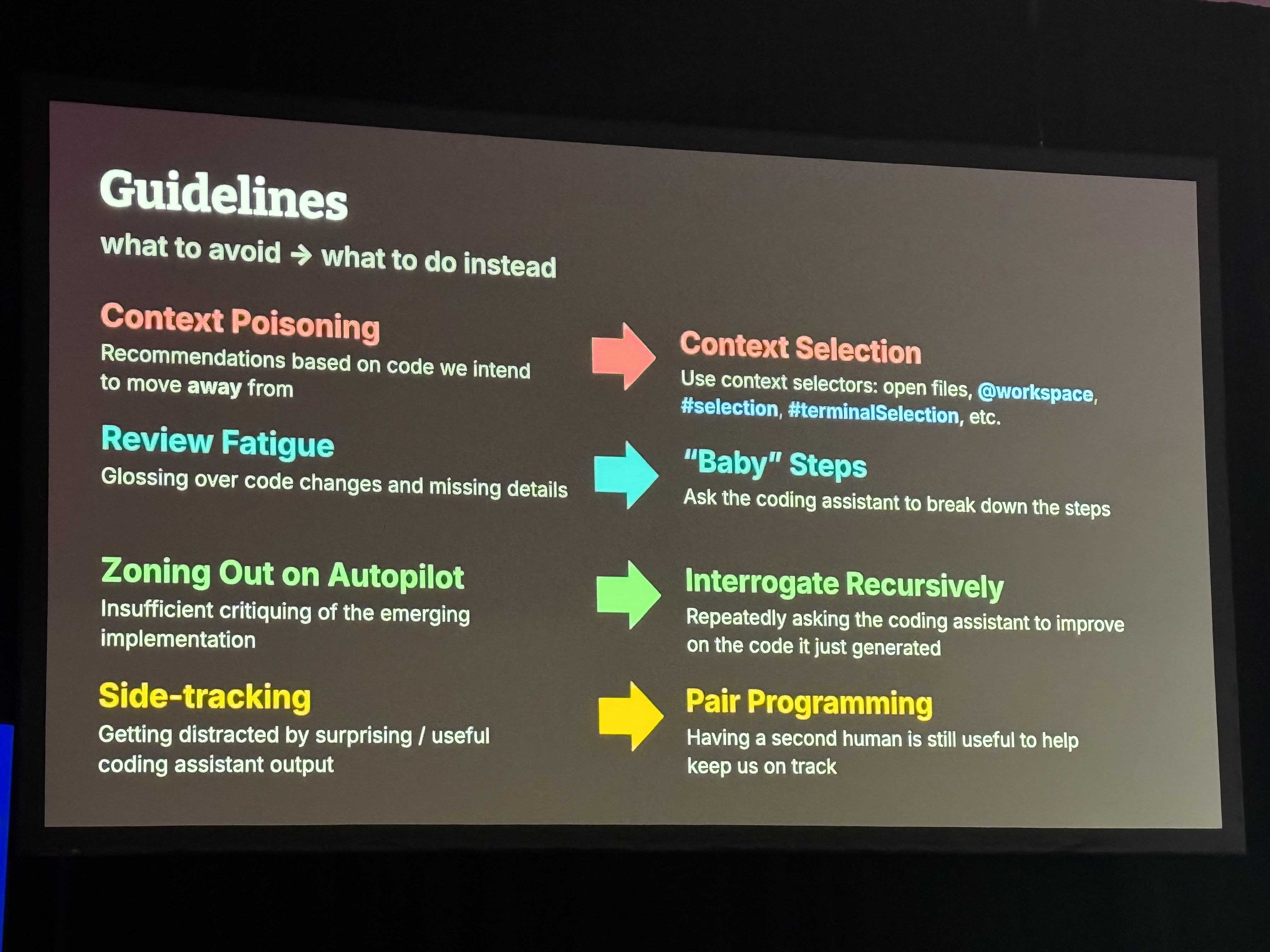
Michael Grinich, CEO at WorkOS: Crossing the Enterprise Chasm
__Takeaway: __The "enterprise chasm" is the gap between early adopters and the early majority. Not crossing this chasm leads promising startups to failure. Strategies for avoiding this failure include:
- Plan Early for Enterprise Use: Start considering enterprise needs from the outset.
- Focus on Under-Served Technologies: Take existing technology that has yet to be adopted at the enterprise level and focus efforts there. For example, Slack is the market’s preferred real-time communication tool by far, but Microsoft Teams is still widely used, even though it came to market later than Slack because it is enterprise-focused.
Attending LeadDev New York 2024 was a fun and informative experience. I also spent a few extra days after the conference exploring NYC, which was a blast. Overall, my second LeadDev conference did not disappoint, and I'm excited to see what the 2025 conference will have in store!

Thanks for reading! If you attended the conference or have thoughts on these talks, please connect with me or message me on LinkedIn.